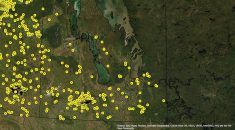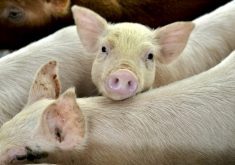Hog Watch is back.
Proposed changes to manure management in the province have revived the dormant activist group.
Hog Watch first formed in 1999 with the aim of monitoring the expansion of Manitoba’s hog industry, but after a moratorium on new hog barns was introduced by the previous NDP government in 2006, the group disbanded.
Now, proposed amendments to the Environment Act under Bill 24 — otherwise known as the Red Tape Reduction and Government Efficiency Act — have the farmers and environmentalists who make up Hog Watch deeply concerned. The group reconvened in Portage la Prairie last week to assess the situation and strategize on how best to address the Progressive Conservative government’s regulatory proposal.
Read Also

Biogas pitched to turn farm waste into renewable energy
Anaerobic digestion can convert manure and other agricultural waste into renewable energy as well as fertilizer, but Manitoba farmers don’t have the best history with the technology
Vicki Burns sits on the group’s nine-member steering committee and said she was “shocked” to learn about the province’s proposed amendments to the Livestock Manure and Mortalities Management Regulation or LMMMR.
“I never imagined that we would go backwards,” Burns said. “The bottom line is that Lake Winnipeg — and other lakes in Manitoba — have really been suffering more blue-green algae blooms in the last couple of decades and we don’t want to see that increasing. Some of that blue-green algae is toxic and it has very, very serious health impacts for any life that is depending on that water.”
How much of a role intensive livestock operations like hog farms have played in dictating water quality in Manitoba has been hotly debated over the last decade. However, Burns stressed that Hog Watch is cognizant of the fact no one factor is solely responsible for the health of Manitoba’s waterways and noted sewage from Winnipeg is a major contributor to Lake Winnipeg’s poor health.
“I think it’s important to make clear that I, and other people who have been involved in Hog Watch, are not opposed to the hog industry, we’re not even opposed to expansion if we could be certain that things were done in a way that would not risk phosphorus and nitrogen running off and getting into our waterways,” she said. “But at this point, there has been no clear evidence or indication of what new science this government is working on that would make room for a relaxation of the regulations.”
Bill 24 would affect several areas of regulation that impact producers and includes the repeal of the Manitoba Natural Resources Development Act. If passed this fall, the proposed legislation would also “remove general prohibitions from the Environment Act for the expansion of hog barns and manure storage facilities.”
The hog barn moratorium had been partially dismantled in the last year of the previous government’s reign through a series of smaller regulatory changes. However, then premier Greg Selinger’s government stopped short of removing general prohibitions.
In an emailed statement, Agriculture Minister Ralph Eichler said that his government is “open to allowing the livestock sector in our province to grow in a responsible and sustainable way and welcome input from all stakeholders.”
He added the government’s move to eliminate requirements for anaerobic digestion systems for hog manure is based on an expert report produced by the University of Manitoba. Commissioned by the NDP, Eichler said the report was previously unreleased.
“The report found the treatment unnecessary, elaborate and costly,” the minister stated. “Additionally, proposed changes to LMMMR align with environmental standards set out by the Canadian Environmental Commission in a review of the hog industry. Other environmental restrictions on hog operations remain in place, such as the requirement for manure management plans, soil samples and the ban on winter spreading.”
Andrew Dickson, general manager of the Manitoba Pork Council, said he wasn’t surprised the group had resurfaced, noting there is room for all voices in a democracy. However, he added that some of the concerns being raised about the proposed changes have been “alarmist” in nature.
“Somehow everyone has got this idea that the province is going to be opening up the regulations so people can put manure on in the wintertime and that’s a fallacy. There is no intention in regulations or in the act to do that. I don’t understand where it comes from,” said Dickson.
Fears that Bill 24 will lead to the unbridled expansion of the hog industry in Manitoba are also unfounded, Dickson said, noting that after a years-long moratorium on new barns most hog farmers are looking to replace existing barns that are now reaching the end of their lifespan.
“That’s not an expansion, that’s just replacing the capacity you’ve already got,” he said. “We do need to do a modest expansion to make better use of some of the processing facilities we have in the province, but I think we’d be quite happy if we got a two per cent or maybe a three per cent growth in numbers over a period of time. We’re not looking at a massive expansion in the industry.”
He added that the pork council and producers want to work collaboratively with communities if there are concerns and make sure the public knows what the proposed changes entail.
“We don’t want to get into a controversial situation where people are not accepting of these operations,” Dickson said.
Farmers and members of the public can take part in planned public consultations on the issue until May 12.



















